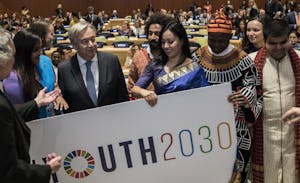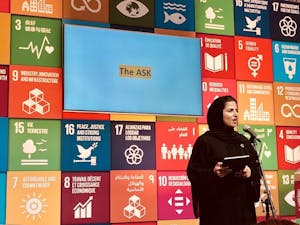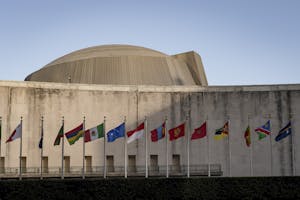While President Trump’s “America First” message dominated headlines at this year’s United Nations General Assembly, a different message echoed across the UN and New York City: a firm belief in global cooperation and a commitment to driving progress on global challenges.
Last week, government leaders, businesses, young people, cities, celebrities, entrepreneurs, civil society, and more came together in New York to focus on urgent – and deeply interconnected – global issues.
Five of the major themes that emerged from the whirlwind week include:
Knowing Where We Are, and Where We Need to Be, on SDG & Climate Action
A constant refrain throughout the week was reaching a more granular understanding of where we are – and actions critically needed — for the Sustainable Development Goals (SDGs) and climate agendas. Progress continues to be made in key areas like poverty eradication, energy access, and child mortality. New actors are orienting their work in these two agendas. And the SDGs even made the Daily Show.
However, at current rates, the world is not on track to achieve either the SDGs or the Paris Agreement on climate change. As the UN Deputy Secretary-General warned, while “much has been done in the three years since we agreed the goals…we remain at best in second gear.” Approximately 44 million lives are at stake and we’re seeing stagnant and – in some cases – negative trends on issues including gender equality, non-communicable diseases (NCDs), and air pollution. The places where some of the largest risks to the SDG and climate agendas lie are in fragile or conflict-affected states. For example, the World Food Programme’s David Beasley spoke about how food insecurity and hunger are growing in conflict-ridden Yemen.
Throughout the week, partners responded accordingly, working to increase ambition and action.
- The annual Goalkeepers report highlighted the importance of human capital investments like health and education, particularly for young people and girls.
- On global health, the UN hosted two high-level meetings on tuberculosis and NCDs, focusing global attention on these issues that collectively cause more than 70% of global deaths.
- On education, a number of important developments surfaced, from a commitment to girls’ education to the launch of the International Finance Facility for Education to the hosting of the High-level Meeting on Action for Refugee Education.
- Data was a constant focus, including the launch of the 50 X 2030 Initiative to help end hunger through regular and publicly-available surveys of farming households in low and lower-income countries, the launch of the Famine Action Network to use data to support famine prevention and preparedness, and the release of a new report on challenges and opportunities for SDG progress in fragile and conflict-affected states.
- On climate change, the Secretary-General gave a clear call on the risks of inaction, stating “If we do not change course in the next two years, we risk runaway climate change.” Building on the recent Global Climate Action Summit, the week saw new commitments and announcements, including the second One Planet Summit to review progress and accelerate implementation of the Paris Agreement, as well as a clear recognition that climate action can drive progress on every other development and security challenge we face.
It was also encouraging to see all sectors begin to focus on greater alignment in 2019. Next year will bring two major milestone moments: the Secretary-General’s Climate Summit and a meeting of heads of state to reaffirm commitment to the SDGs and report on progress. These two events will take place virtually simultaneously next fall, creating an enormous opportunity to reinforce the interconnected nature of SDG and climate efforts and solutions.
Youth Claim Their Seat at the Table
At nearly a quarter of the world’s population, young people – who represent the fastest growing population in several regions of the world – are helping to drive new ideas and solutions on key issues. To better engage young people, the UN launched Youth2030, its first-ever Youth Strategy to pivot from working for young people to working with them to understand their needs, put their ideas into action, and ensure their voices are heard.
The launch of Youth2030 also coincided with the launch of Generation Unlimited, a multi-stakeholder initiative to ensure all young people are in school, training, or employment by 2030. The role of the Secretary-General’s Envoy on Youth in working with young people to develop and implement solutions for progress is an important and exciting effort that is already making a difference.

Innovative Solutions and the Role of the Private Sector Intertwine
Throughout the week, the importance of innovative solutions – and the entrepreneurs and private sector leaders behind them – were top of mind. The third annual Solutions Summit, held in partnership with Local2030, brought together 10 inspiring solution makers from communities around the world to present their breakthrough efforts to policymakers, investors, and industry leaders. In addition, the second annual Bloomberg Global Business Forum explored how collaboration between government and business can address some of the world’s most critical challenges affecting trade, globalization, innovation, and competition.
At the Leaders Summit, hosted by the UN Global Compact, the Secretary-General appealed to businesses to step up in promoting human rights and tackling inequality, taking local action, and financing sustainable development. And the launch of the World Benchmarking Alliance highlighted the critical need for new tools to measure, incentivize, and shift corporate performance on sustainability and the SDGs.
Underpinning many of these initiatives is the need to mobilize capital to support necessary investments in global progress. The launch of the Secretary-General’s Strategy on Financing the 2030 Agenda was a highlight of the week as leaders from multilateral institutions, government, business, and civil society pledged to increase levels of financing for sustainable development and create levers of change in an attempt to fundamentally shift financial markets.
The strategy outlined three key pillars: aligning global economic policies and financial systems with the SDGs, enhancing sustainable financing strategies and investments at the regional and country levels, and harnessing the potential of new innovations, technologies, and digitalization to provide equitable access to finance. The week also featured the launch of two new important reports on financing, including one from the Overseas Development Institute on financing the end of extreme poverty, and one from Convergence on the state of blended finance. It was clear that companies and the investing community recognized the ways they could help advance development and stability.

Getting Ahead of Emerging Issues
Although we are only on the brink of understanding emerging issues such as new technologies and anti-microbial resistance, they were central to the discussion at the UN. Emerging technologies have the potential to rapidly accelerate progress toward the SDGs. But as the Secretary-General warned, they also present new international security challenges and have the potential to exacerbate inequalities.
To help ensure that new technologies can be leveraged for good, the Secretary-General launched a High-level Panel on Digital Cooperation this summer, co-chaired by Melinda Gates and Jack Ma. The panel held its first in-person meeting on the sidelines of the General Assembly, during which the panel members discussed how individuals and organizations can take advantage of new technologies, how we can put human rights at the center of the digital transformation, and how we can close the digital divide. These themes were woven throughout the week during the many discussions at side events on the future of work, new technologies, and digital finance.
Multilateralism Matters
An undercurrent of all of these themes was a firm belief in the critical role of multilateralism. World leaders spanning political affiliations reaffirmed the commitment of international cooperation and a strengthened UN. In his address to the General Assembly, the Secretary-General underscored the urgency of the moment: “Multilateralism is under fire precisely when we need it most.”
His call to action was embraced by others throughout the week. Leaders from every sector and industry reiterated the importance of working together in an increasingly interconnected world to tackle complex challenges – from climate change and global health to progress on the Global Compacts for Refugees and for Migration.
As we hurtle toward the end of 2018, it’s clear that accelerating progress and achieving our goals will only be possible with collaborative and creative partnerships – and with solutions that build on collective strengths and commitments to a better future.




 View All Blog Posts
View All Blog Posts


